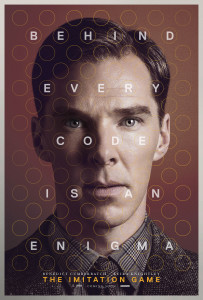Three-Word Summary: Brilliant code breaker
Rating: 5/5
Alan Turing is the father of modern computers. The story of his life is as incredible as it is sad.
A brilliant mathematician and cryptographer, Turing helped the British to break the German enigma code machine during the height of World War II.
In so doing, he created a machine that would be the predecessor to the modern computer. His contributions to the war efforts, not to mention technology, are incalculable — even for him.
Despite this, his sexual orientation led to persecution by his government in a time when homosexuality was illegal in England. This eventually led to his suicide a few short years after the war.
The Imitation Game tells the true story of Turing’s contributions and struggles. Benedict Cumberbatch does a remarkable job in portraying the ironically enigmatic Turing, a similar role to his embodiment of Sherlock Holmes.
The filmmakers may have taken some liberties with telling the story, embellishing some parts and glossing over others, but that they can reveal a secret held for over 50 years is incredible in itself.
The end of the film was certainly politically charged with a thinly-veiled commentary of our modern day treatment of the gay community. But that only serves to make this film more powerful because it demonstrates how important an individual can be regardless of their sexual orientation.
Because Alan Turing should not be defined by his homosexuality; he should be measured by and remembered for his brilliance as an innovator and heroism in helping to end a world war.
